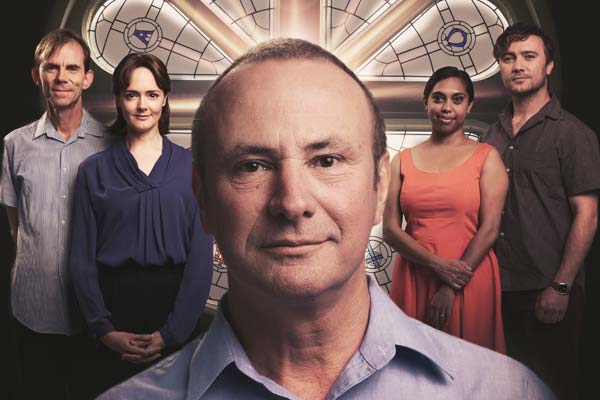'St Mary's In Exile' is a new play by David Burton about the events in the parish of South Brisbane that led to the removal of the parish Priest (Fr Peter Kenny) from office and the formation of the St Mary's in Exile community.
Queensland Theatre Company's Artistic Director Sam Strong's introduction suggests the play "establishes its own genre of spiritual thriller" but clearly states it is "by no means a factual blow-by-blow of the true events".
The play opens with Peter preparing to move out, caught up in self-reflection, and a young man comes into the church, maybe for help, maybe for an argument, maybe to specifically goad Peter. We remain unsure of the identity and purpose of this 'Man' character throughout (although a psychological explanation is hinted at in the final moments) but he prompts Peter to tell the story in flashbacks.
The action commences innocuously enough with a man complaining about a statue of arguably more-or-less Buddhist credentials in the church. It soon goes for the full drama to be had from a more extensively complaining letter from the Archbishop, the excitement of social justice rallies, and the hierarchy politics of who is allowed to speak for the parish or the church: The five parish protagonists are introduced to us at some kind of parish committee: Peter, Terry (the second priest), Ruth (the head of Micah the social action organisation started by the parish), Beth (head of the LGBT group) and Joseph (general parish representative).
However, they are shortly lined up, backs against the wall, playing the media headline announcers: it's a clever device that both tells us what is being reported in the public arena, and embroils them in the media frenzy.
The unfolding and creation of action through the media is further developed with a spoof 'Q&A' scene where Peter's open responses and explorations on national TV lead the parish into further complications. (It also includes a hilarious and somewhat self-indulgent caricature of Tony Abbott.) The five frequently reconvene to discuss the developing situation, and this recurrence could be better used to draw themes together as the piece progresses. Their meetings certainly show the internal strife created by the external threat: there begin to be fundamental differences between them about how far to stand on principle or whether to compromise on dogma in order to retain capacity to act socially and maintain the community how it is.
'St Mary's In Exile' has lots of interesting material, many great lines and ironic moments, and fascinating characters with their own remarkable histories: as a result it falls into the trap of trying to do too much. There are lots of philosophical ideas thrown about, often through the self-reflection of Kenny's character, and it's not one-sided: we see the issues from even the Archbishop's point of view. A bit like the media it critiques, it throws out the profound sound bytes, however it never manages to fully grapple with those questions of "who we are without the institutions and labels that we use to define us", of the importance (or not) of faith and its relationship to religion; of the need for traditions and hierarchies in communities, or leadership and guidance.
It comes across as a potentially great but under-developed script: the story has intrinsic drama but a play has to be much more selective than a novel.
The cast was generally strong: there are great performances from Chenoa Deemal as Beth and Bryan Probets as Joseph (and Tony Abbott). Peter Marshall is largely convincing in the demanding role of Peter Kenny, but Kevin Spink came across as a bit too gormless to be Terry, the priest who was being credited with getting so much of the good work done. The design aspects were excellent (as we have come to expect from QTC's talented team). The simple lines of the scenery adapted to offer us a modern church, TV studio or inner sanctuary: supporting but never detracting from the action; and the costume and make-up supported the characterisation admirably.
This play considers so many fascinating points, and points of view about religion, belief, community and identity, but it isn't tied together well. It lacks a framework for us to pin our comprehension to and follow the ideas forward.
We experience the floundering of the protagonists but we also need to see the emerging intentions of the playwright. The narrative chops and changes a lot: maybe it's meant to be a textural representation of struggling to find a path? If so, it's at the expense of understanding and clarity of purpose.
'St Mary's In Exile' is thought-provoking, funny, entertaining... But ultimately, in its current state, it doesn't thrill.
★★★☆☆
St Mary's In Exile plays at Queensland Theatre Company until 25 September.
– written by Kate Byrne

